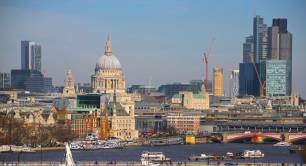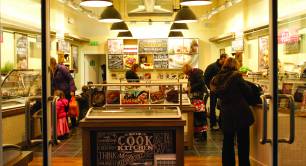What happens when a boy leaves the city to brave the Wild West of social investment?
We’ve all heard the saying: “You can take the boy out of the city, but you can’t take the city out of the boy”.
In 2011, Nick O’Donohoe left the City and struck out into the Wild West of ‘social investment’.
In his previous life he had a successful career with JP Morgan. As one of its most senior directors he had thrived amongst the slickest of City slickers.
And then he walked right into the Wild, Wild West. Uncharted territory, a place inhabited by a tough group of pioneers who had spent years breaking the land – occasionally finding diamonds, but mostly breaking their backs as they tried to figure out how to use investment capital to help solve social problems.
Amazing, uncompromising, committed people like Rod Schwartz, David Hutchison, Caroline Mason, Michelle Giddens, Geoff Burnand, Danyal Sattar, Toby Eccles, Ben Metz, Pradeep Jethi, Anthony Ross, Jonathan Jenkins, Joe Ludlow, Brian Whittaker, John Kingston, Mark Campanale, Nigel Kershaw and Tim Jones. Tough, committed, driven pioneers all.
When he walked into this Wild West, wearing his Saville Row suit, he did so carrying a great fortune – £600m, to be precise. Whilst some of this money was seen as legitimate (dormant bank accounts), some viewed the rest as filthy lucre, the guilt-money extracted from the naughty banks at the barrel of a gun by the Chancellor for the unprecedented subsidy that society had been forced to offer them.
“What sort of cowboy is this?” we all asked. He looks like a banker and talks like a banker. How on earth will he avoid getting his lights punched out in the saloon bar?
That, certainly, was my reaction.
Sir Ronald Cohen had legitimacy – it was he who had cracked on to the opportunity of dormant bank accounts, been appointed to chair ‘the Commission for Unclaimed Assets’ and conceived of the idea of a ‘social investment bank’. But who was this ‘other rapporteur’, this JP Morgan suit who had overseen the production of some crazy research, which bore no relation to what was, at the time, these harsh barren lands of the Wild West?
Surely he was either stupid (believing his own bullshit), or he was a careerist (after his own balance sheet to manage).
It was, to us fools digging away in the desert, almost inconceivable that this suited and booted investment banker could have reached the conclusion that the City orthodoxy was, well, wrong.
It is important to remember that, at the time, the orthodoxy was that the role of investment capital was, simply, to create more capital. Social issues were outsourced – a matter for government and charity. Any challenge to this was considered at best eccentric, or more normally just plain deluded.
Could it really be that this man actually believed in social investment – and was willing to stake his reputation on it?
We can only survive if we collaborate, share learning, support one another, give our power away.
Well, we found out. The boy left the City and struck out into the Wild West. And initially he brought quite a lot of the City with him. Big Society Capital (BSC) has rightly been criticised for establishing a hierarchical structure and for treating information as power. To say that communication was inadequate in the early years would be an understatement – on the basis that communication is something that is two-way (not one way) and good communication can only happen when relationships are open, honest and transparent.
But the boy did leave the City. BSC has evolved, and continues to evolve. The ways of the City – competition, secrecy, power – do not work in the Wild West. Here, we can only survive if we collaborate, share learning, support one another, give our power away. We cannot know everything. Change is an uncertain process – especially when it involves human beings. Distress comes from alienation, social outcomes come from reconciliation and healing. This requires a different approach. A relational approach which values diversity and works together.
When we understand this, we can raise barns, break land and find gold.
And the City has a lot to teach us cowboys – rigour, accountability, discipline, clarity, focus – these things are GOOD. Nick’s lasting achievement will have been to leave the City – to seek solutions to social problems, and all of the uncertainty that this involves. But more than that, his achievement is to do this without relinquishing all the good things about the City.
Personally, I have been amazed at what BSC have achieved. Panahpur partnered with NESTA in the Big Society Finance Fund (an experiment led by NESTA to model what BSC might do), and we screened over 150 submissions which indicated to me that it would be hard to deploy £10m, let alone £500m. To have done what BSC have, in the volume that it has, over the last 3 years is extraordinary.
So I take my hat off to Nick O'Donohoe – the boy that left the City because he wanted to help the pioneers as they sought to create a better world in the Wild West. He has clearly learned through the process – something magical happens when the best of the City finds common cause with the best of the Wild West. He has found that magic – just look at the calibre and culture of the team at BSC. It is a matter of regret that he has decided to move on now, just as BSC is hitting its straps – and as he has personally come to a place where he has such expertise in the need for both – rooted in deep trust, on both sides.
Thank you, Nick. You have my deepest respect. But I have one final request: I hope that whoever replaces you understands the value that both the City and the Wild West offer. Great power for deep change is unleashed in our society when they are reconciled to, and so work with, one another.
Photo credit: Aleem Yousaf



